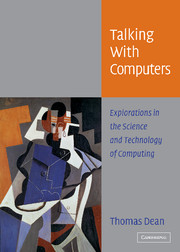Book contents
- Frontmatter
- Contents
- Preface
- Acknowledgments
- 1 TALKING WITH COMPUTERS
- 2 THE SHELL GAME
- 3 KEEPING TRACK OF YOUR STUFF
- 4 DON'T SWEAT THE SYNTAX
- 5 COMPUTATIONAL MUDDLES
- 6 GETTING ORIENTED
- 7 THANKS FOR SHARING
- 8 YOU'VE GOT (JUNK) EMAIL
- 9 MODERN ARCHITECTURE
- 10 DO ROBOTS SLEEP?
- 11 UNDER THE HOOD
- 12 ANALYZE THIS
- 13 FOREST FOR THE TREES
- 14 SEARCHING THE WILD WEB
- 15 DARWIN'S DANGEROUS ALGORITHM
- 16 AIN'T NOBODY HERE BUT US MACHINES
- Bibliography
- Index
1 - TALKING WITH COMPUTERS
Published online by Cambridge University Press: 05 June 2012
- Frontmatter
- Contents
- Preface
- Acknowledgments
- 1 TALKING WITH COMPUTERS
- 2 THE SHELL GAME
- 3 KEEPING TRACK OF YOUR STUFF
- 4 DON'T SWEAT THE SYNTAX
- 5 COMPUTATIONAL MUDDLES
- 6 GETTING ORIENTED
- 7 THANKS FOR SHARING
- 8 YOU'VE GOT (JUNK) EMAIL
- 9 MODERN ARCHITECTURE
- 10 DO ROBOTS SLEEP?
- 11 UNDER THE HOOD
- 12 ANALYZE THIS
- 13 FOREST FOR THE TREES
- 14 SEARCHING THE WILD WEB
- 15 DARWIN'S DANGEROUS ALGORITHM
- 16 AIN'T NOBODY HERE BUT US MACHINES
- Bibliography
- Index
Summary
Hardly a day goes by that I don't write at least one short computer program: a few lines of code to explore an idea or help organize my thoughts. I think of it as simply talking with my computer, and more and more often there is a computer available to talk with, often several of them joining in the conversation simultaneously. Each time you click on a link in a browser, you cause a sequence of computations involving dozens if not hundreds of computers scattered all over the world.
Making a computation happen is not, however, the same thing as programming. There are lots of powerful programs written by talented programmers that you can call up with a click of a mouse or few keystrokes. These programs animate computers, breathing life and spirit into lumps of metal and plastic. Even if you know what's going on inside computers and computer programs, it's easy to imagine that programs are spells and the programmers who create them are sorcerers. When you click on the icon for a program, you invoke these spells and the spells conjure up spirits in the machine. But this book isn't about invoking the spells of others; it's about creating your own spells and conjuring spirits of your own design.
This is not to say I won't encourage you to use code written by other programmers. Quite the contrary: an important part of the power of computing is that good spells can be reused as often as needed.
- Type
- Chapter
- Information
- Talking with ComputersExplorations in the Science and Technology of Computing, pp. 1 - 21Publisher: Cambridge University PressPrint publication year: 2004



